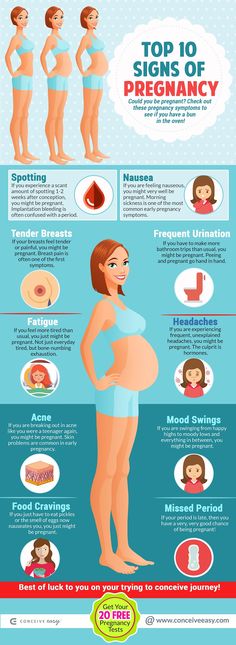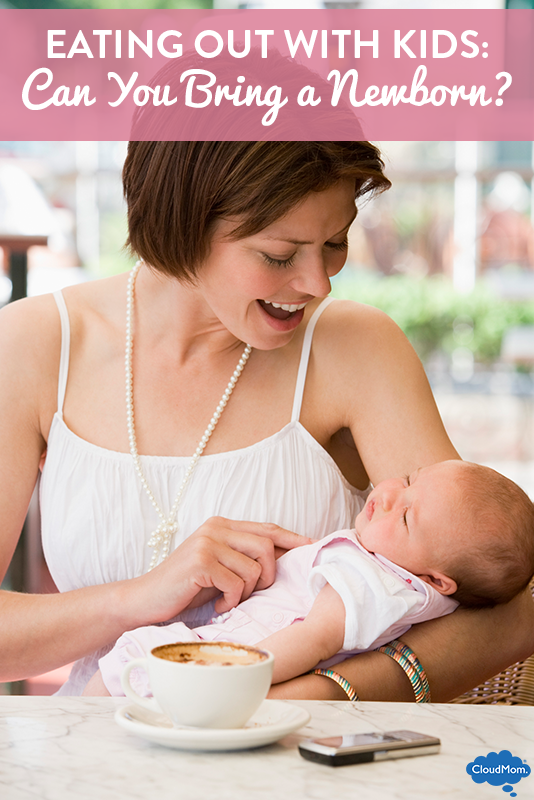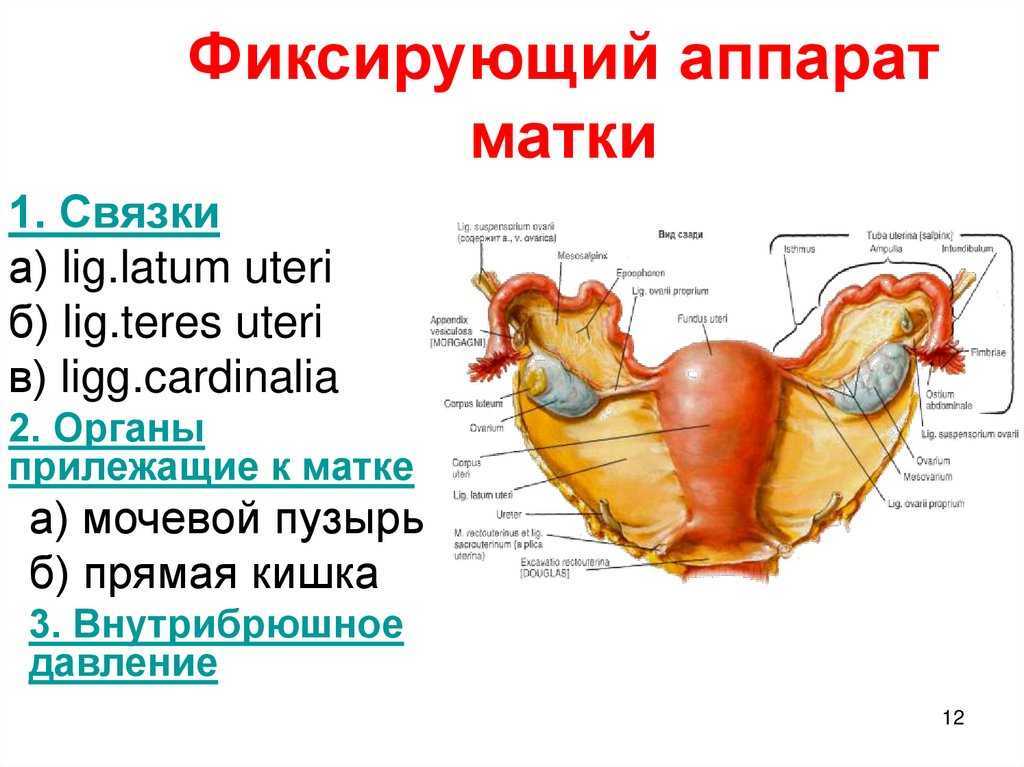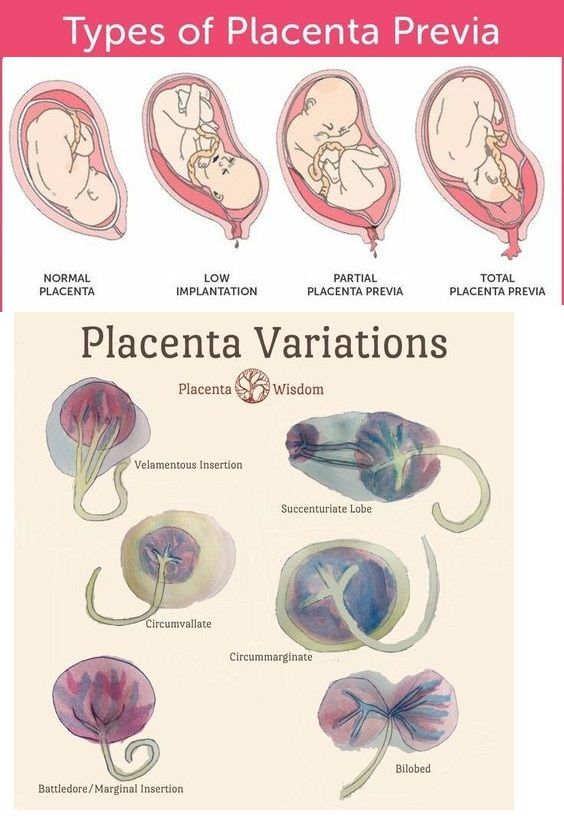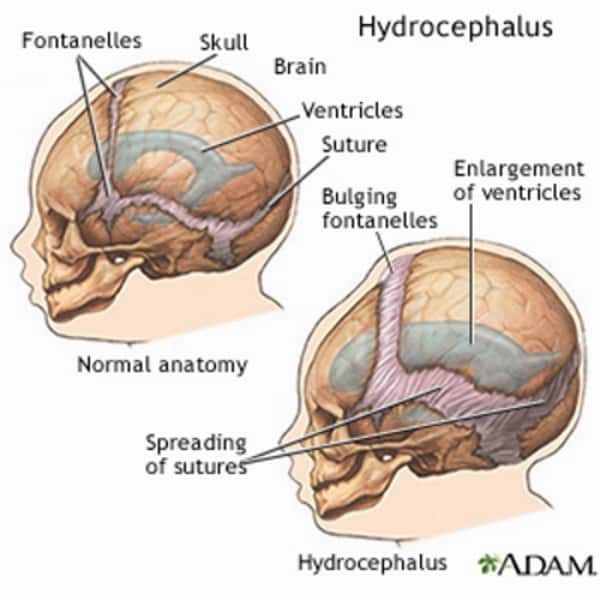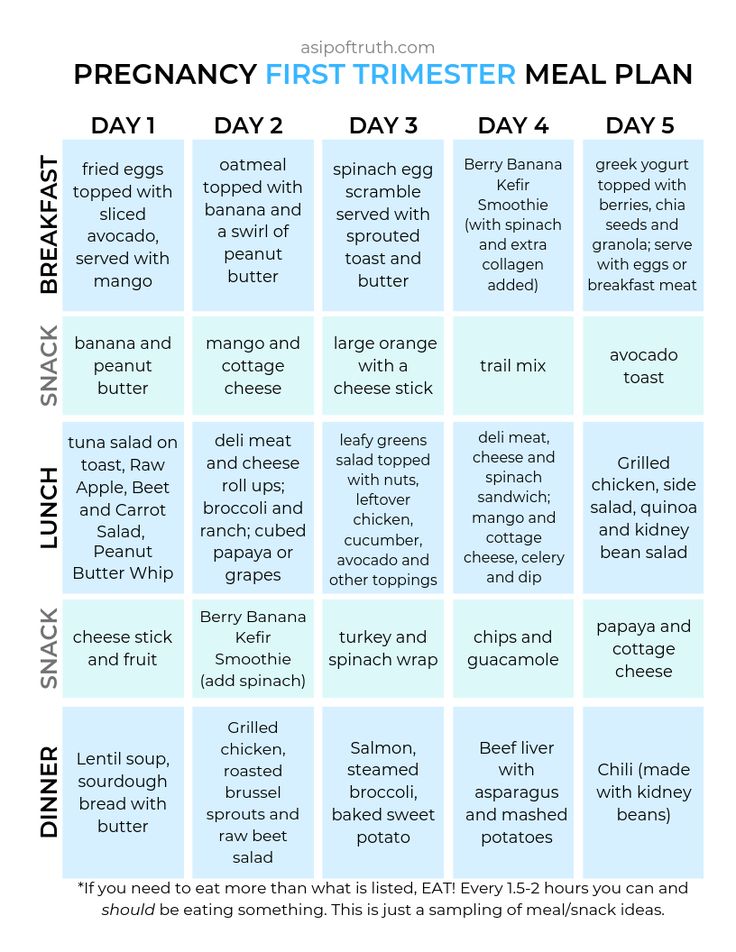How early can you feel fatigue in pregnancy
What to expect from pregnancy fatigue
Pregnancy is all about changes, and some are more dramatic than others. Along with all the physical changes happening to your body, you may also be experiencing symptoms like mood swings, swelling, nausea or morning sickness, to name a few. So, it can be easy to overlook something as straightforward as fatigue.
But as you may be finding out, fatigue can be quite a challenge, too. Below, we cover everything you can expect from this common pregnancy symptom, its causes, and what you can do to manage it.
What does pregnancy fatigue feel like?
Fatigue is totally normal during pregnancy, but people’s experiences with it can vary widely. It may be that you don’t experience much fatigue at all, or it may be that you feel extreme tiredness in early pregnancy that drops off later on. No matter how it affects you, fatigue can generally be characterized by:
- Difficulty getting up in the morning
- Daily tasks becoming harder to complete
- Difficulty focusing
- Constant tiredness throughout the day
- Irritability
- Feeling weak
When does pregnancy fatigue start?
Pregnancy fatigue can start as soon as one week after conception, which means it may be an early sign of pregnancy before a test can tell you for sure. It’s also common to start feeling tired any time during the first 12 weeks.
What causes fatigue during pregnancy?
There are various factors that can cause fatigue, but they differ from trimester to trimester.
First trimester fatigue
The overall cause of fatigue in early pregnancy is simple – your body is preparing for the months ahead. But there are a couple parts of this preparation that can really contribute to feelings of fatigue:
- Hormone changes: There are a lot of hormone changes that happen in early pregnancy. One of them, a big jump in progesterone levels, has been directly linked to fatigue. The emotional ups and downs that come with hormone changes can be tiring, too.
- Metabolic changes: Creation takes energy. And in addition to a fetus, your body is making a placenta and extra blood. All these things create a greater demand for energy and may be partly why you feel the urge to sleep more.
Second trimester fatigue
In the second trimester, people typically find that they have more energy – you may be used to the new hormone levels in your body, and your baby isn’t very big yet.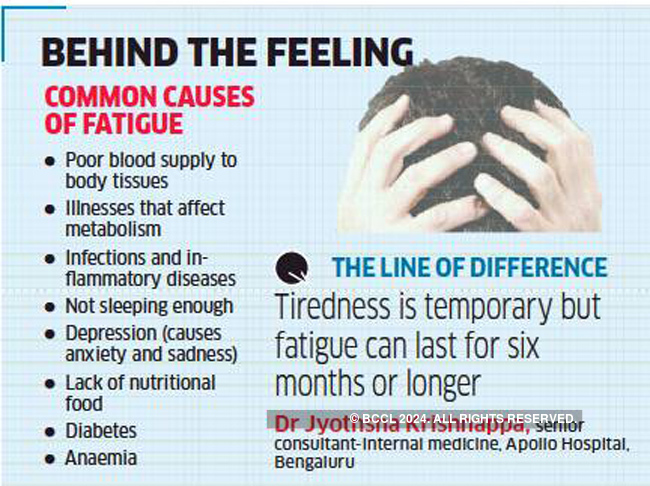 But it’s still possible to feel fatigued in the second trimester, especially if your sleep gets interrupted by pregnancy symptoms like frequent urination and leg cramps.
But it’s still possible to feel fatigued in the second trimester, especially if your sleep gets interrupted by pregnancy symptoms like frequent urination and leg cramps.
Third trimester fatigue
When fatigue happens in the third trimester, it’s generally because the baby’s gotten bigger. Carrying around that extra weight can be tiring on its own, but it also makes other things harder, including sleeping comfortably. Plus, as the baby settles into the pelvis, it puts more pressure on the bladder, so nighttime trips to the bathroom may become even more common. And all of that is in addition to any other pregnancy symptoms you’re experiencing.
Tips to overcome pregnancy fatigue and get more energy
When it comes to managing fatigue, the best thing you can do is take steps to increase your energy levels. This means:
Stay on top of your nutrition
A solid pregnancy diet can be a great way to keep your energy up. In particular, focus on getting enough iron, which supports red blood cell production and prevents any additional tiredness from anemia (a condition which results from not having enough red blood cells to carry the amount of oxygen your body needs). Foods that are high in protein are also good choices, as protein is a longer-lasting source of energy compared to carbohydrates.
Foods that are high in protein are also good choices, as protein is a longer-lasting source of energy compared to carbohydrates.
You may benefit from eating smaller meals throughout the day. This can help keep your blood sugar and energy levels consistent. It’s also important to drink plenty of water, as water helps your body function properly.
Exercise
The American College of Obstetricians and Gynecologists recommends that you get at least 150 minutes of moderate aerobic activity each week while you’re pregnant. That may sound like a lot, but if you break it down into 30 minutes of pregnancy-safe exercises per day, it adds up quickly.
Exercise improves blood circulation, which helps bring oxygen to every part of your body. This can give a boost to overall energy levels. Plus, exercise helps manage other pregnancy symptoms like back pain and constipation.
Rest
Even if you’re doing everything you can to boost your energy levels, you still have to listen to your body.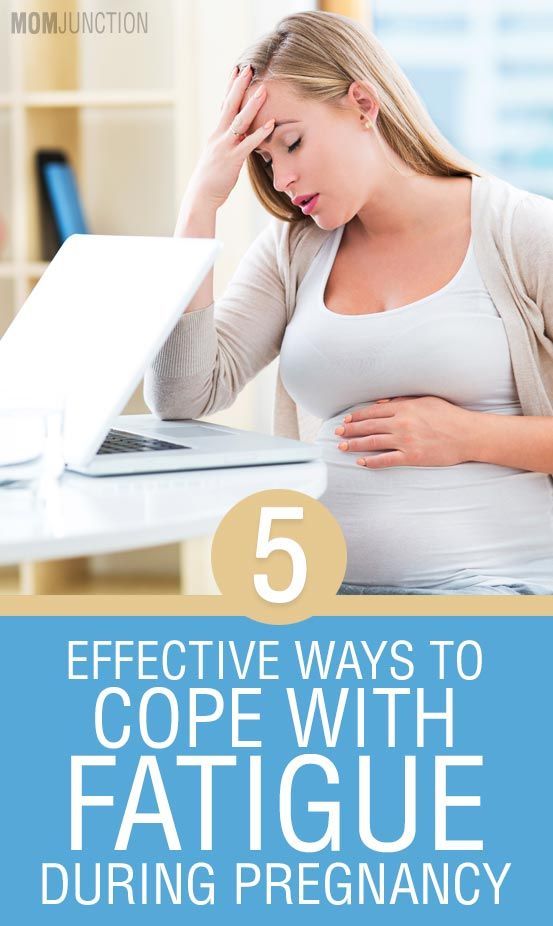 And when your body is fatigued, rest is the answer. Take breaks throughout the day, nap when you need to and sleep as much as possible. It may help to go to bed earlier, and avoiding fluids for a few hours before going to bed can help cut down on bathroom visits at night.
And when your body is fatigued, rest is the answer. Take breaks throughout the day, nap when you need to and sleep as much as possible. It may help to go to bed earlier, and avoiding fluids for a few hours before going to bed can help cut down on bathroom visits at night.
When should I see my doctor or midwife about fatigue during pregnancy?
Fatigue is very common and normal during pregnancy. Still, don’t hesitate to talk to your care provider at any point along your prenatal appointment timeline if you have questions or concerns about your level of tiredness.
But keep in mind, there are times when fatigue may be a symptom of a pregnancy complication like anemia, depression or gestational diabetes. Call your care provider if you experience sudden fatigue, fatigue that completely stops you from doing your daily tasks or if you have fatigue with any of the following:
- Fever
- Pain in the chest, abdomen or head
- Dizziness
- Difficulty breathing
- Swelling in your hands, ankles or feet
- Vision changes
Get the care you need
Whether your pregnancy is making you tired, nauseous or anything else, a prenatal appointment can help.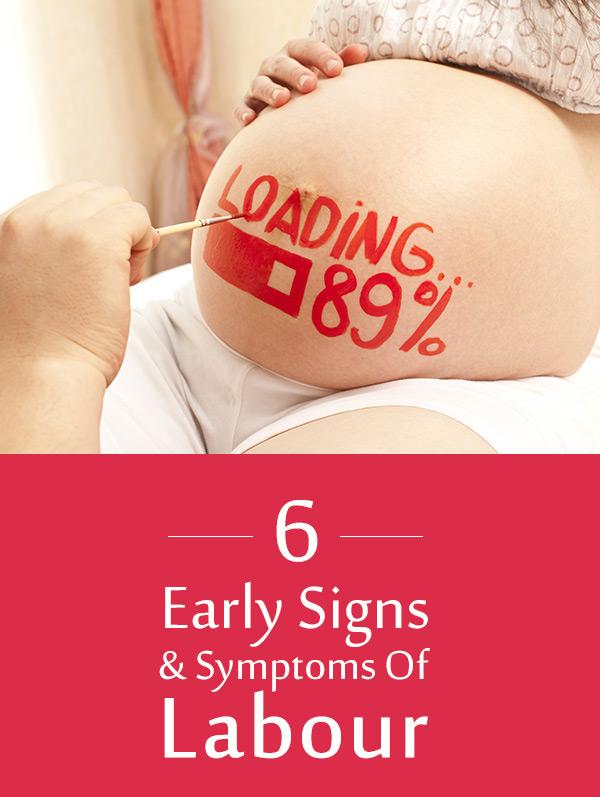 In addition to making sure you and your little one are safe and healthy, your care provider can give you tips and recommendations for every part of your pregnancy.
In addition to making sure you and your little one are safe and healthy, your care provider can give you tips and recommendations for every part of your pregnancy.
When Does It Start And How to Deal With Being Bone-Tired
Pregnancy
by Scary Mommy
Updated:
Originally Published:
Shironosov/ Getty
There is perhaps no better way to describe pregnancy fatigue than to say it’s an exhaustion unlike anything you’ve ever known. On the plus side, this means that those early months of pregnancy may bring you some of the deepest sleep you’ll experience in your life. Alternately, you may want to hit the snooze button on, well, everything.
But, hey — cut your body some slack. After all, it’s busy baking up an entire tiny human. Still, fatigue is a common pregnancy symptom, so it’s helpful to know what you can expect.
When does pregnancy fatigue kick in?
You may start to feel unusually tired as early as the first week after conception. For this reason, women often cite pregnancy fatigue as one of the earliest indicators that they’re expecting. In fact, per the American Pregnancy Association, pregnancy fatigue is most common in the first trimester. It then tends to dissipate during the second trimester (no wonder it’s called “The Happy Trimester”) and return during the home stretch.
How will you know when it hits? In an exploratory study published by the US National Library of Medicine, 90 percent of 25- to 30-year old women polled experienced fatigue — and this fatigue significantly impacted their ability to maintain their personal and social activities.
What causes fatigue during pregnancy?
There’s a logical reason pregnancy fatigue often plagues women during their first trimester — your newly pregnant body is a swirling vortex of increased blood and hormonal changes. Things like a spike in progesterone levels and your body adapting to its new physical demands can zap you of energy.
Things like a spike in progesterone levels and your body adapting to its new physical demands can zap you of energy.
In later stages of pregnancy, fatigue may also be exacerbated by a lack of sleep. Between raging heartburn and your burgeoning belly, there are plenty of reasons you can’t get comfortable enough at night to enjoy quality slumber. We’d be remiss not to remind you that roughly 100 of those reasons will be all the times you get up to go pee in the middle of the night now.
What can you do to help with fatigue?
This may sound deceptively simple, but arguably the best way to combat pregnancy fatigue is to get some rest. If you feel tired and have the opportunity or ability to indulge that feeling, take a nap. Spend a lazy day inside binge-watching Netflix. It goes without saying that slowing down can be easier said than done. Still, you should stock up on that super-deep-pregnancy-fatigue sleep however and whenever you can.
You might also have to master the art of saying no. If your commitments — whether they’re personal or professional — start to feel overwhelming, scale them back for the sake of saving your energy. Eating a well-balanced diet, staying hydrated, and incorporating moderate activity (think a 30-minute walk after lunch) can all help you feel more energized, too.
If your commitments — whether they’re personal or professional — start to feel overwhelming, scale them back for the sake of saving your energy. Eating a well-balanced diet, staying hydrated, and incorporating moderate activity (think a 30-minute walk after lunch) can all help you feel more energized, too.
What should you avoid?
While it’s totally understandable to feel like you need to mainline coffee just to stay awake, it’s advisable to avoid caffeine during pregnancy (or at least limit your intake). It’s better to drink plenty of water, instead.
Is pregnancy fatigue ever a cause for concern?
Fortunately, pregnancy fatigue typically doesn’t negatively impact anything but your social life. It’s simply your body’s response to the monumental task of harboring a little human in your uterus. So, in other words, it’s normal. However, if you have any concerns about how tired you feel, don’t hesitate to reach out to your doctor. In rare cases, underlying conditions like anemia or chronic fatigue syndrome could be contributing to your exhaustion and require attention. Most likely, though, you’ve got nothing to worry about (other than figuring out your favorite napping spot).
Most likely, though, you’ve got nothing to worry about (other than figuring out your favorite napping spot).
Written by Julie Sprankles.
Read More:
Early Pregnancy Symptoms: The Very First Signs You Might Be Pregnant
Pregnancy Skin Conditions Can Wipe The Glow And The Smile Off Your Face
Swollen Cankles and Other Indignities of Pregnancy Caused by Your New Friend, Edema
This article was originally published on
Drowsiness and fatigue during pregnancy - causes and how to deal with them
“Pregnancy is not a disease,” a future mother can hear when she complains of fatigue or that she cannot quickly cope with her usual activities, concentrate . And it is true. Pregnancy is not a disease, but a huge complex of physiological processes that take place in the female body and give life to a new person. It is not surprising that the creation of a new life takes a lot of strength and energy from a woman. nine0003
nine0003
Fatigue during pregnancy is a normal reaction of the body to bearing a child, as well as drowsiness, inability to concentrate and mood swings.
Where does the strength of a pregnant woman go and what causes fatigue during pregnancy at different stages?
Sleepiness and fatigue in early pregnancy
Tiredness in early pregnancy is easy to explain.
First, the fetus actively grows and develops, its internal organs are formed. The processes of synthesis of proteins and other molecules, acting as a "building material" for new cells, proceed rapidly. This wastes energy. nine0003
Secondly, a powerful hormonal restructuring takes place in the body of a pregnant woman, an additional circle of blood circulation is formed. The circulatory system is rebuilt, the load on the heart increases. The hormone progesterone, produced in the first weeks of pregnancy, affects vascular tone, lowering blood pressure. If you have experienced low blood pressure personally, then you know this condition. Similarly, a pregnant woman experiences drowsiness, it is difficult for her to concentrate.
Similarly, a pregnant woman experiences drowsiness, it is difficult for her to concentrate.
Thirdly, all the resources of the body are directed first to the formation and development of the fetus, and then to the normal needs of the female body. This applies to both energy and nutrients. A woman simply does not have enough “fuel” to provide not only for her unborn child, but also for herself. This is especially acute for women who do not take vitamins during pregnancy. The fact is that many vitamins and minerals, on the one hand, are needed for energy production (especially for B vitamins), on the other hand, these same micronutrients are needed for the proper development of the fetus. For example, from vitamin B9depends on the closure of the neural tube - the basis of the spinal cord and brain.
And, finally, toxicosis also contributes to fatigue in the first trimester. This condition can be accompanied not only by nausea and vomiting, but also by drowsiness, fatigue, and rapid mood swings. Toxicosis, if it passes without health complications, is considered a normal, although not very pleasant, element of pregnancy. In this case, one of the likely causes of toxicosis is a lack of vitamin B6. nine0003
Toxicosis, if it passes without health complications, is considered a normal, although not very pleasant, element of pregnancy. In this case, one of the likely causes of toxicosis is a lack of vitamin B6. nine0003
By the second trimester, the hormonal background stabilizes, but other reasons lead to weakness and drowsiness during pregnancy.
Late term drowsiness
The fact is that in the third trimester the child's weight becomes quite significant and grows rapidly. The weight of the placenta and the fluid that fills it should be added to the weight of the fetus. That is why the load on the body of a pregnant woman (especially the legs and back) becomes palpable. Even after walking a short distance, a woman may feel tired, as if she was carrying heavy loads. And yet it is so! nine0003
Another cause of late-term sleepiness is rather commonplace. With a large belly, it is more difficult to fall asleep and get enough sleep. It is difficult for a woman to turn around or take her usual position, the child may begin to push in her sleep. After all, if in ordinary life we don’t get enough sleep for a night or two, then we can sleep off on the weekends, and there are no days off from pregnancy.
After all, if in ordinary life we don’t get enough sleep for a night or two, then we can sleep off on the weekends, and there are no days off from pregnancy.
But drowsiness during late pregnancy can be a symptom of a dangerous disease - anemia, lack of iron in the body. It is especially bad because it develops gradually, and it can easily be mistaken for ordinary overwork. Pallor, fatigue, rapid pulse, heart pain, dizziness and fainting during pregnancy are all signs of anemia and a reason to see a doctor as soon as possible. It is impossible to delay a visit to a specialist: anemia can have the most serious consequences, up to the loss of a child. Iron supplements usually help prevent anemia. It is better to choose iron in liposomal form, which is well absorbed. nine0003
How to deal with drowsiness and fatigue during pregnancy
Despite the fact that the beginning of pregnancy, most women spend at work in the same mode as usual, experts strongly recommend that they slow down their rhythm of life a little and take more rest.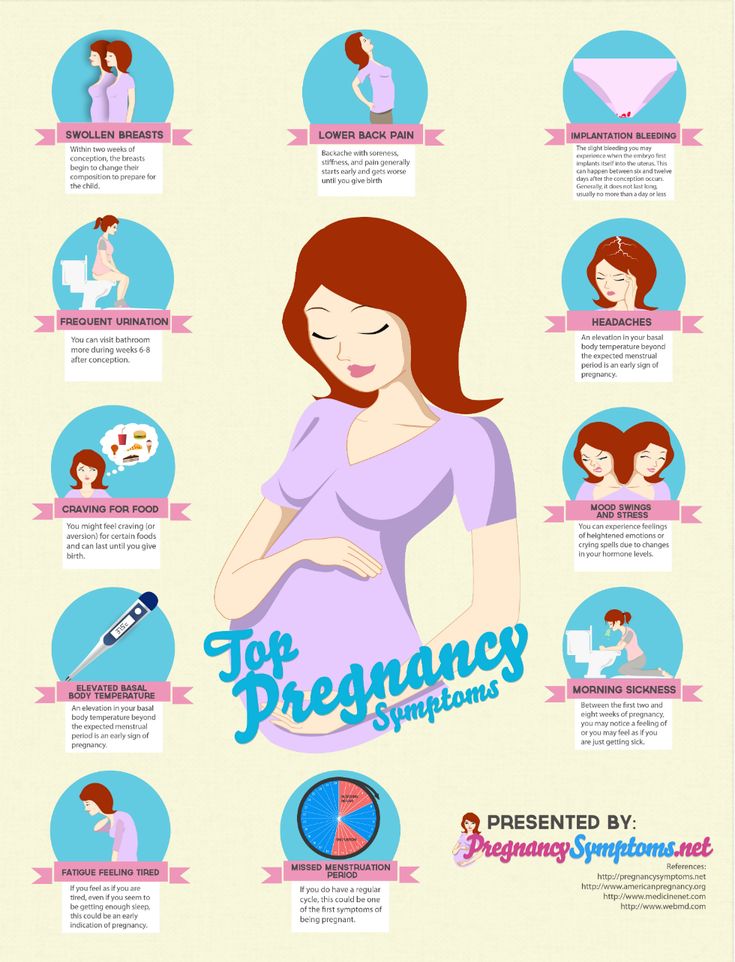
Great changes are taking place in the body of a pregnant woman, and it would be wrong to load oneself with work in the same way as always. And if a woman says that her pregnancy was much easier and she didn’t need rest, you can only be happy for her, but you should listen only to your feelings. nine0003
How to deal with drowsiness during pregnancy, or at least reduce the level of fatigue as much as possible?
- You should definitely get more sleep. Lack of sleep makes a person shaky, nervous. Which, in turn, greatly affects the level of stress. Stress interferes with normal sleep - and the circle closes. You can buy special pillows under the stomach, which help to take a comfortable position in a dream.
- Eat properly and fully! This will help to provide both organisms - both the mother and the unborn child - with everything necessary, as well as avoid health problems, prevent weight gain that affects the feeling of fatigue, especially by the last trimester.
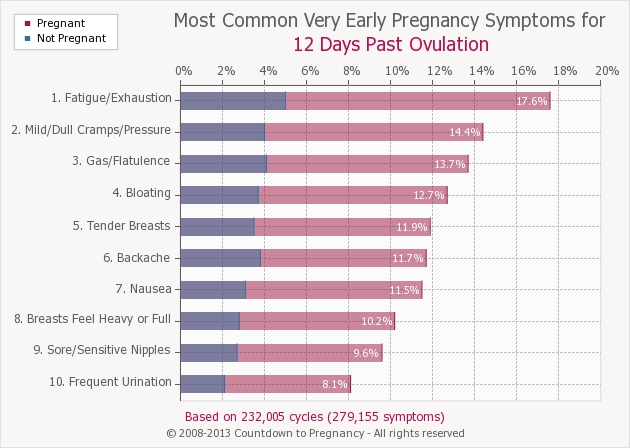 Be sure to include vitamin and mineral complexes for pregnant women in the diet, for example, Pregnoton Mom - with B vitamins, liposomal iron and other micronutrients that are important for the health of mother and baby. nine0040
Be sure to include vitamin and mineral complexes for pregnant women in the diet, for example, Pregnoton Mom - with B vitamins, liposomal iron and other micronutrients that are important for the health of mother and baby. nine0040 - Walking in the fresh air (especially in the morning, when the least amount of gas pollution) will help to tone the muscles, enrich the blood with oxygen.
- Take CoQ10. It is involved in energy production at the cellular level. That is, it does not work as an energy tonic, but helps the body naturally efficiently extract energy from food. In addition, studies show that CoQ10 reduces the risk of preeclampsia and other pregnancy complications. nine0039 Vitamins C and E will also help you stay energetic and active. Vitamin C is also involved in the synthesis of energy, and vitamin E is necessary for cellular respiration, without which muscle weakness develops in the body.
- Coenzyme Q10, vitamins C and E are contained in the antioxidant complex Sinergin, which will give a pregnant woman additional energy.
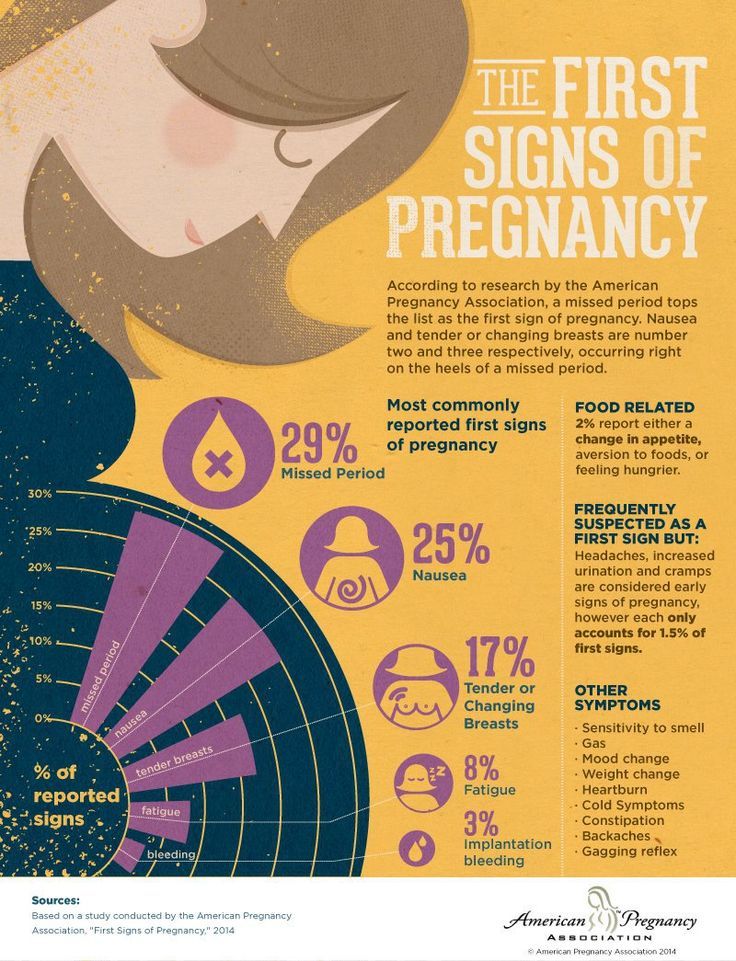 Of course, Sinergin is allowed to be taken throughout pregnancy.
Of course, Sinergin is allowed to be taken throughout pregnancy.
When does sleepiness go away during pregnancy? nine0009
When will fatigue and drowsiness during pregnancy go away? It is impossible to predict this, because each woman's pregnancy is individual. Some will feel much better already in the second trimester of pregnancy, while others will need additional support of vitamins and antioxidants throughout the pregnancy.
It is important not to forget: fatigue, drowsiness, absent-mindedness and the inability to concentrate are manifestations of pregnancy, which are largely explained by physiology, and not by character traits. It is not necessary to give the expectant mother advice like “get together and make yourself work”, “stop being lazy”, etc. After all, having a baby is hard work. nine0003
The world will not collapse if a woman stops carrying it on her shoulders alone, starts to rest more during pregnancy or asks for help. The most precious thing is the health and well-being of the woman herself and the unborn child.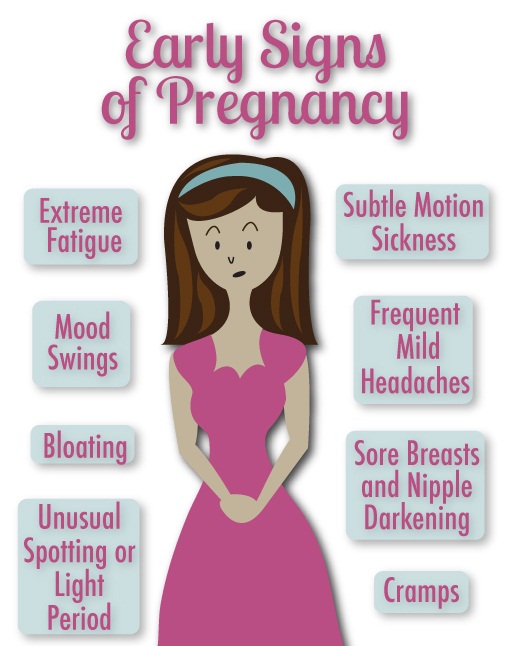
IS NOT ADVERTISING. THE MATERIAL IS PREPARED WITH THE PARTICIPATION OF EXPERTS.
Related articles
- Coenzyme Q10 for pregnancy planning
- Pregnoton Mom: instructions for use
- Progesterone in early pregnancy
1st trimester of pregnancy: what happens to the fetus
1st trimester of pregnancy: what happens to the fetus - Private maternity hospital Ekaterininskaya Clinics1st trimester: 1st-12th weeks
The gestational age is calculated from the first day of the last menstruation, since it is difficult to determine the exact day of conception. Since conception usually occurs in the middle of the menstrual cycle, you are not actually pregnant during the first two weeks, but this period is counted as the beginning of pregnancy. nine0003
As soon as the fertilization of the egg takes place around the 3rd week, the hormones begin to produce changes in your body little by little.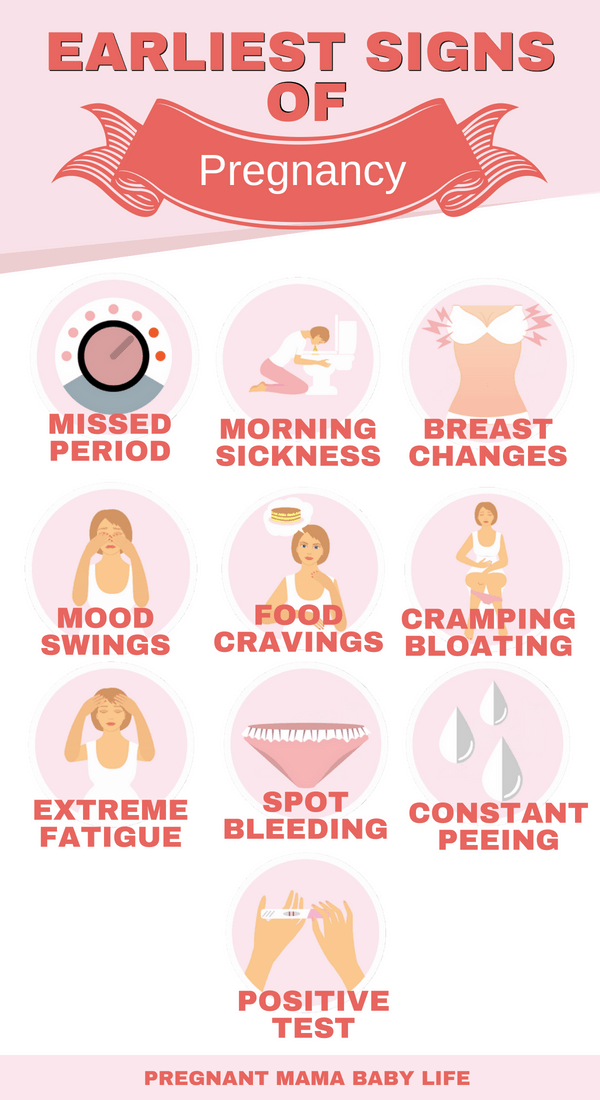 As a result, you may experience some of the following symptoms:
As a result, you may experience some of the following symptoms:
- Morning sickness. As a result of rising levels of hormones characteristic of pregnancy, up to 80% of women in the 1st trimester experience morning sickness with symptoms such as nausea and vomiting. The idea that such malaise is observed only in the morning is a common misconception. In fact, symptoms can appear at any time of the day or night. Up to 1 in 5 women experience morning sickness in the 2nd trimester of pregnancy and can sometimes persist throughout pregnancy. nine0002 If you experience morning sickness, avoid foods that make you sick, eat little and often, avoid fatty and spicy foods, drink more water. If you experience severe symptoms or symptoms that bother you, see your doctor.
- Breast changes. The mammary glands will begin to increase in size, soreness may appear. The nipples will increase in size, become darker and more protruding.
- Fatigue.
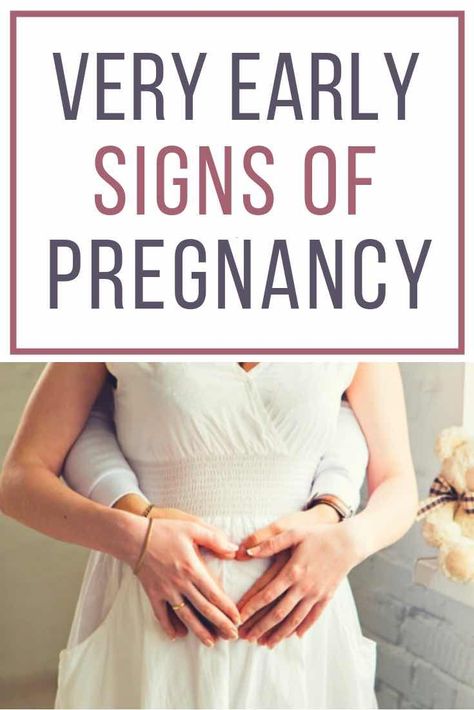 High levels of the hormone progesterone can make you feel tired and sleepy. Rest as often as possible in a horizontal position with your legs up and eat as well as possible, which is not easy if you are experiencing morning sickness! nine0040
High levels of the hormone progesterone can make you feel tired and sleepy. Rest as often as possible in a horizontal position with your legs up and eat as well as possible, which is not easy if you are experiencing morning sickness! nine0040 - Increased emotionality. A higher level of emotionality, manifested as a result of an increase in hormone levels, is a normal phenomenon. Understanding and patience on the part of your partner and loved ones is very important here.
- Food likes and dislikes. You may find yourself intolerant of one food and addicted to another. This is usually not a problem, unless you feel like eating weird foods like chalk. If you are concerned about the situation, contact your doctor. nine0040
- Frequent urination. As your body fluid levels increase and your uterus presses on your bladder, you will become more likely to visit the toilet. Go to the toilet as soon as you feel the need - this minimizes the pressure on the bladder.

- Feeling of dizziness. Sometimes you may feel a little dizzy (this is due to hormonal changes). Try not to stay on your feet for a long time and slowly rise from a sitting or lying position. If you experience severe dizziness, contact your doctor immediately. nine0040
- Heartburn and constipation. Your digestive system will slow down to give you more time to digest your food. This can lead to heartburn and constipation. To help manage heartburn, try to eat small meals at regular intervals and avoid fried or spicy foods and carbonated drinks. Constipation is helped by eating a diet rich in fiber, maintaining physical activity and drinking plenty of water. nine0051
- Approximately 7 days after fertilization, the embryo implants in the uterine wall. The placenta, umbilical cord and amniotic sac will begin to form to provide nourishment and protection to the embryo.
- By the end of the first 12 weeks of pregnancy, the uterus is palpable through the wall of the abdomen, the abdomen will begin to grow.

- All the main organs of the baby are formed, the circulatory system works.
- The development of the genital organs has begun.
- Fingers are formed on the hands and feet, nails have appeared.
- Facial features have formed.
- The length of the baby's body is about 6 cm from the head to the lower part of the body, he is already recognizable. The baby moves in the amniotic sac, but you don't feel it move yet.
1st trimester milestones
Child development in the 1st trimester of pregnancy
By the end of the 1st trimester:
Clinic mobile app
You can make an appointment with a doctor, get tests
and much more...
Fill out the form to make an appointment or order a call back
I agree with personal data processing policy and user agreement I also give my consent to the processing of personal data.
Sign up for a consultation
I agree with personal data processing policy and user agreement I also give my consent to the processing of personal data.